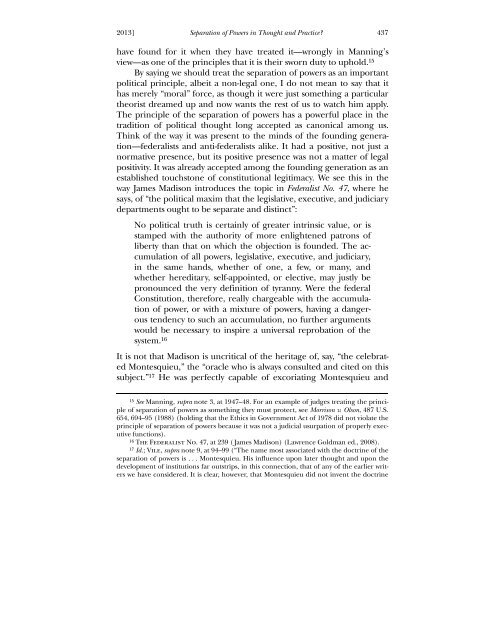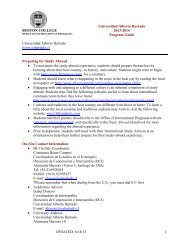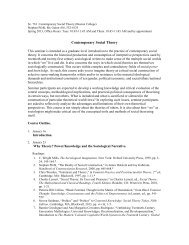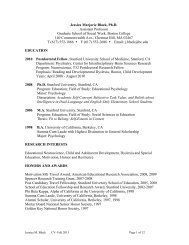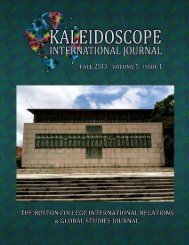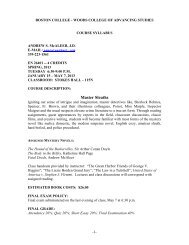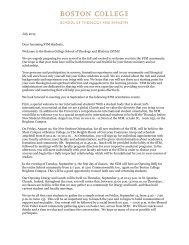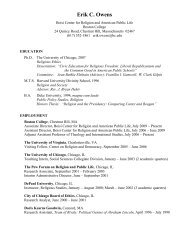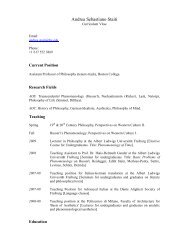separation of powers in thought and practice? - Boston College
separation of powers in thought and practice? - Boston College
separation of powers in thought and practice? - Boston College
You also want an ePaper? Increase the reach of your titles
YUMPU automatically turns print PDFs into web optimized ePapers that Google loves.
2013] Separation <strong>of</strong> Powers <strong>in</strong> Thought <strong>and</strong> Practice? 437<br />
have found for it when they have treated it—wrongly <strong>in</strong> Mann<strong>in</strong>g’s<br />
view—as one <strong>of</strong> the pr<strong>in</strong>ciples that it is their sworn duty to uphold.15<br />
By say<strong>in</strong>g we should treat the <strong>separation</strong> <strong>of</strong> <strong>powers</strong> as an important<br />
political pr<strong>in</strong>ciple, albeit a non-legal one, I do not mean to say that it<br />
has merely “moral” force, as though it were just someth<strong>in</strong>g a particular<br />
theorist dreamed up <strong>and</strong> now wants the rest <strong>of</strong> us to watch him apply.<br />
The pr<strong>in</strong>ciple <strong>of</strong> the <strong>separation</strong> <strong>of</strong> <strong>powers</strong> has a powerful place <strong>in</strong> the<br />
tradition <strong>of</strong> political <strong>thought</strong> long accepted as canonical among us.<br />
Th<strong>in</strong>k <strong>of</strong> the way it was present to the m<strong>in</strong>ds <strong>of</strong> the found<strong>in</strong>g generation—federalists<br />
<strong>and</strong> anti-federalists alike. It had a positive, not just a<br />
normative presence, but its positive presence was not a matter <strong>of</strong> legal<br />
positivity. It was already accepted among the found<strong>in</strong>g generation as an<br />
established touchstone <strong>of</strong> constitutional legitimacy. We see this <strong>in</strong> the<br />
way James Madison <strong>in</strong>troduces the topic <strong>in</strong> Federalist No. 47, where he<br />
says, <strong>of</strong> “the political maxim that the legislative, executive, <strong>and</strong> judiciary<br />
departments ought to be separate <strong>and</strong> dist<strong>in</strong>ct”:<br />
No political truth is certa<strong>in</strong>ly <strong>of</strong> greater <strong>in</strong>tr<strong>in</strong>sic value, or is<br />
stamped with the authority <strong>of</strong> more enlightened patrons <strong>of</strong><br />
liberty than that on which the objection is founded. The accumulation<br />
<strong>of</strong> all <strong>powers</strong>, legislative, executive, <strong>and</strong> judiciary,<br />
<strong>in</strong> the same h<strong>and</strong>s, whether <strong>of</strong> one, a few, or many, <strong>and</strong><br />
whether hereditary, self-appo<strong>in</strong>ted, or elective, may justly be<br />
pronounced the very def<strong>in</strong>ition <strong>of</strong> tyranny. Were the federal<br />
Constitution, therefore, really chargeable with the accumulation<br />
<strong>of</strong> power, or with a mixture <strong>of</strong> <strong>powers</strong>, hav<strong>in</strong>g a dangerous<br />
tendency to such an accumulation, no further arguments<br />
would be necessary to <strong>in</strong>spire a universal reprobation <strong>of</strong> the<br />
system.16<br />
It is not that Madison is uncritical <strong>of</strong> the heritage <strong>of</strong>, say, “the celebrated<br />
Montesquieu,” the “oracle who is always consulted <strong>and</strong> cited on this<br />
subject.”17 He was perfectly capable <strong>of</strong> excoriat<strong>in</strong>g Montesquieu <strong>and</strong><br />
15 See Mann<strong>in</strong>g, supra note 3, at 1947–48. For an example <strong>of</strong> judges treat<strong>in</strong>g the pr<strong>in</strong>ciple<br />
<strong>of</strong> <strong>separation</strong> <strong>of</strong> <strong>powers</strong> as someth<strong>in</strong>g they must protect, see Morrison v. Olson, 487 U.S.<br />
654, 694–95 (1988) (hold<strong>in</strong>g that the Ethics <strong>in</strong> Government Act <strong>of</strong> 1978 did not violate the<br />
pr<strong>in</strong>ciple <strong>of</strong> <strong>separation</strong> <strong>of</strong> <strong>powers</strong> because it was not a judicial usurpation <strong>of</strong> properly executive<br />
functions).<br />
16 The Federalist No. 47, at 239 ( James Madison) (Lawrence Goldman ed., 2008).<br />
17 Id.; Vile, supra note 9, at 94–99 (“The name most associated with the doctr<strong>in</strong>e <strong>of</strong> the<br />
<strong>separation</strong> <strong>of</strong> <strong>powers</strong> is . . . Montesquieu. His <strong>in</strong>fluence upon later <strong>thought</strong> <strong>and</strong> upon the<br />
development <strong>of</strong> <strong>in</strong>stitutions far outstrips, <strong>in</strong> this connection, that <strong>of</strong> any <strong>of</strong> the earlier writers<br />
we have considered. It is clear, however, that Montesquieu did not <strong>in</strong>vent the doctr<strong>in</strong>e


